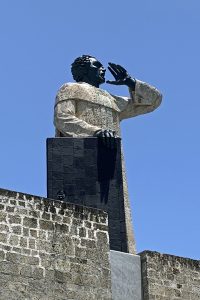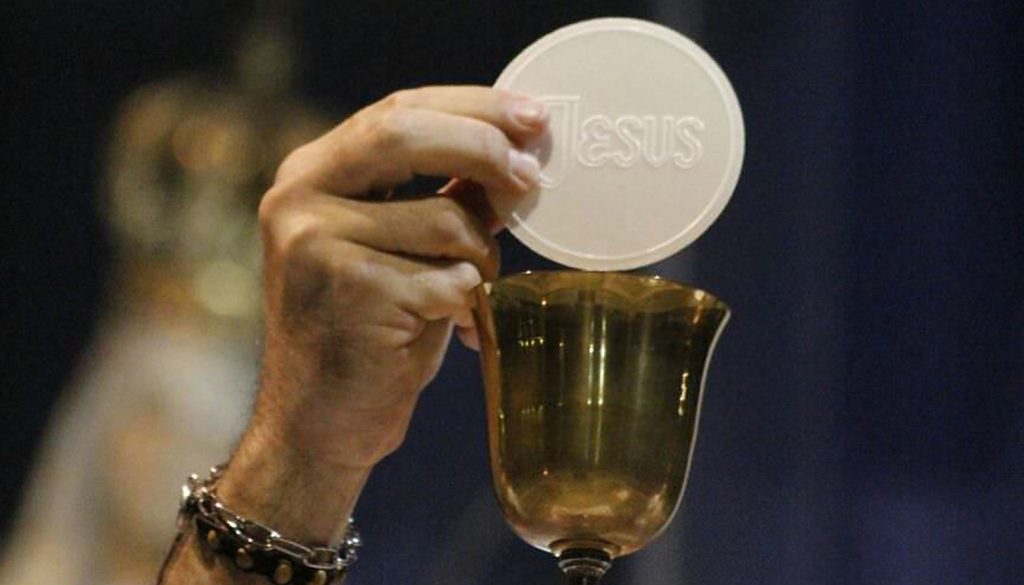The 2021 fall meeting of the United States Conference of Catholic Bishops has concluded. And despite much rancor leading up to the vote, they overwhelmingly passed a new document on the Eucharist: 222 to 8.
There has been talk of such a document since well before President Biden was elected, but some feared that it would be used as a political weapon against Catholic politicians who had a pro-choice stance. The final document makes no explicit mention of denying the Eucharist to politicians. Instead, the U.S. bishops have rightly focused more broadly on renewing the Church’s focus on the source and summit of the Christian life.
Though the document doesn’t discuss it, eucharistic coherence is part of what it means (as St. Paul instructs us) for “worthy” reception of Communion. It is not a prize for the perfect, but if one is in grave mortal sin, one must receive the sacrament of reconciliation before receiving Communion.
This is especially important when the mortal sin is a denial of fundamental justice to a vulnerable population.
The U.S. bishops are unequivocally correct to say that abortion is the denial of fundamental justice and thus a preeminent issue of our time. But the history of Catholics being denied Communion for their support of fundamental injustice doesn’t have much to do with abortion, historically.
One of my favorite examples involves Archbishop Joseph Rummel working to end segregation in the New Orleans Catholic school system in 1962. Segregationists were outraged. Parents threatened to transfer their children to public schools or even boycott the entire school year. The archbishop issued numerous letters to individual Catholics begging for their cooperation — but also being clear that they faced excommunication and denial of the Eucharist if they did not comply.
When three local Catholics organizing protests did not comply, Archbishop Rummel excommunicated them. Some violations of human dignity are so blatant, and so gravely evil, that this unfortunate step needs to be taken.
This was not about punishment but rather part of working toward the sinner’s conversion and welcoming them back. And in this case, it worked: two of the three publicly retracted their views and were reconciled with Christ’s Church.
A similar example takes us back to 1511 and the great Dominican missionary preacher, Father Antón Montesino, who stood before a crowded church in Santo Domingo and said:
“You are all in mortal sin. You live in it, you die in it. All because of the cruel tyranny you exercise against these innocent peoples. Tell me, by what right and with what justice do you so violently enslave these Indians? By what authority do you wage such hideous wars against these people who peacefully inhabit their lands, killing them by unspeakable means? How can you oppress them, giving neither food nor medicine and by working them to death, all for your insatiable thirst for gold? And what care are you providing them spiritually in teaching them about their God and creator, so they are baptized, hear Mass, and keep holy days? Are they not human beings? Do they not have rational souls? Are you not obligated to love them as you love yourselves? Do you not understand or feel this? How can you remain so profoundly asleep?”

David Lantigua, Ph.D., has written beautifully on this episode as the beginning of the West’s recognition of universal human rights. Indeed, the Dominicans repeatedly admonished the slaveholders as mortal sinners and insisted that anyone who refused to free their slaves and make restitution would be denied absolution in confession. This was a last resort to address such widespread and gross injustice entrenched among members of the Church.
Pope Francis recently reminded us that abortion is “homicide,” and “whoever has an abortion kills. No mincing words.” The Church cannot be an institution that “accepts daily murder.” In that same context he went on to discuss “a person who is not in the community, who cannot receive Communion.” Again, this is not punishment but an acknowledgment that someone is outside the Church.
Eucharistic coherence (especially when politicians, of any party, support wildly extreme proposals which legalize abortion through the third trimester) means Catholics who deny fundamental justice have put themselves outside the Church and cannot worthily receive Communion.
Any bishop who acknowledges this, of course, will face fierce attacks and backlash. But who knows what the fruit of such a courageous action could be? It may well lead to repentance and reconciliation. In the case of the Spanish Dominicans, it led to the recognition of universal human rights.
We can’t presume to know what God will do with such courage in our own moment. But here’s one thing we do know: a massive issue of fundamental justice is at stake.

